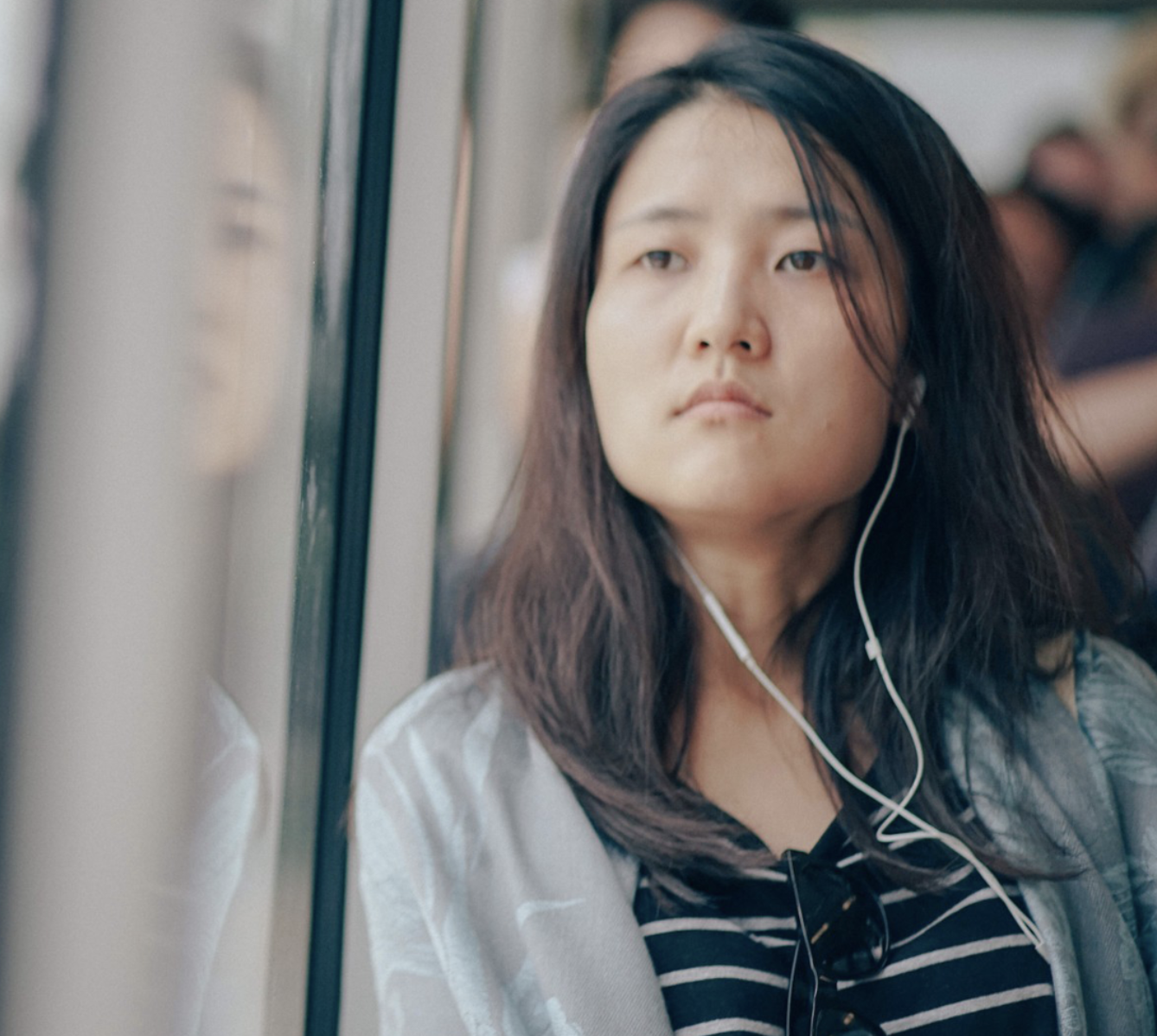Welcome to NAVIGATOR — a project designed to better understand the American public’s views on issues of the day and help advocates, elected officials, and other interested parties understand the language, imagery and messaging needed to make and win key policy arguments. This report focuses on the political and economic concerns and attitudes of Asian Americans, featuring findings from a combined data set of 25,608 registered voters, including 625 Asian Americans, conducted as part of the monthly Navigator poll from April 2018 – March 2020.
In addition, Navigator has conducted regular tracking surveys to understand the impact of the coronavirus crisis on the American public, and this report also focuses on the impact the pandemic has had on Asian Americans using a combined data set of 16,169 registered voters, including 361 Asian Americans, conducted as part of the coronavirus tracking poll from March 20 – May 26, 2020. It is important to note that while Navigator has collected several hundred interviews among Asian Americans, there are some factors that we acknowledge may limit representativeness of the broader Asian American community: Navigator conducts all interviews using opt-in online panels, all interviews were conducted in English language, and certain questions about country of origin, ethnicity, and language spoken at home were not included.
Key Takeaways
[/vc_column_text]
- Asian Americans are more left-leaning on the economy, report net favorable attitudes toward the Democratic Party, and rate organizations like the National Rifle Association unfavorably. However, many identify as independents (38%) — the highest percentage of any racial group.
- Asian Americans express high anxieties about the health impacts of the pandemic and report the highest levels of practicing social distancing relative to other racial groups.
- While the public overall has been split on the Trump administration’s response to the pandemic, Asian Americans are far more critical, but express high degrees of confidence in Democratic governors.
The Political Attitudes of Asian Americans Pre-Pandemic
When it comes to politics, Asian Americans lean toward the Democratic Party, but a sizable number identify as independents. Nearly half of Asian Americans overall call themselves Democrats when it comes to the question of partisanship (38% overall, 45% Asian Americans), a lower compared to other communities of color, but still running ahead of white identification with the Democratic Party (30%). A majority of African Americans and Hispanics identify as Democrats (72% and 50%, respectively). Unlike other demographic groups, Asian Americans express a particularly high level of identification as independents, not aligning with either of the two major parties (32% overall, 38% Asian American). There is a modest split in party identification along lines of gender: Asian American women are slightly more likely to identify as Democrats (47%) compared to men (42%). While more Asian American men are likely to identify as independents (41%) while only a third of women say the same (34%).
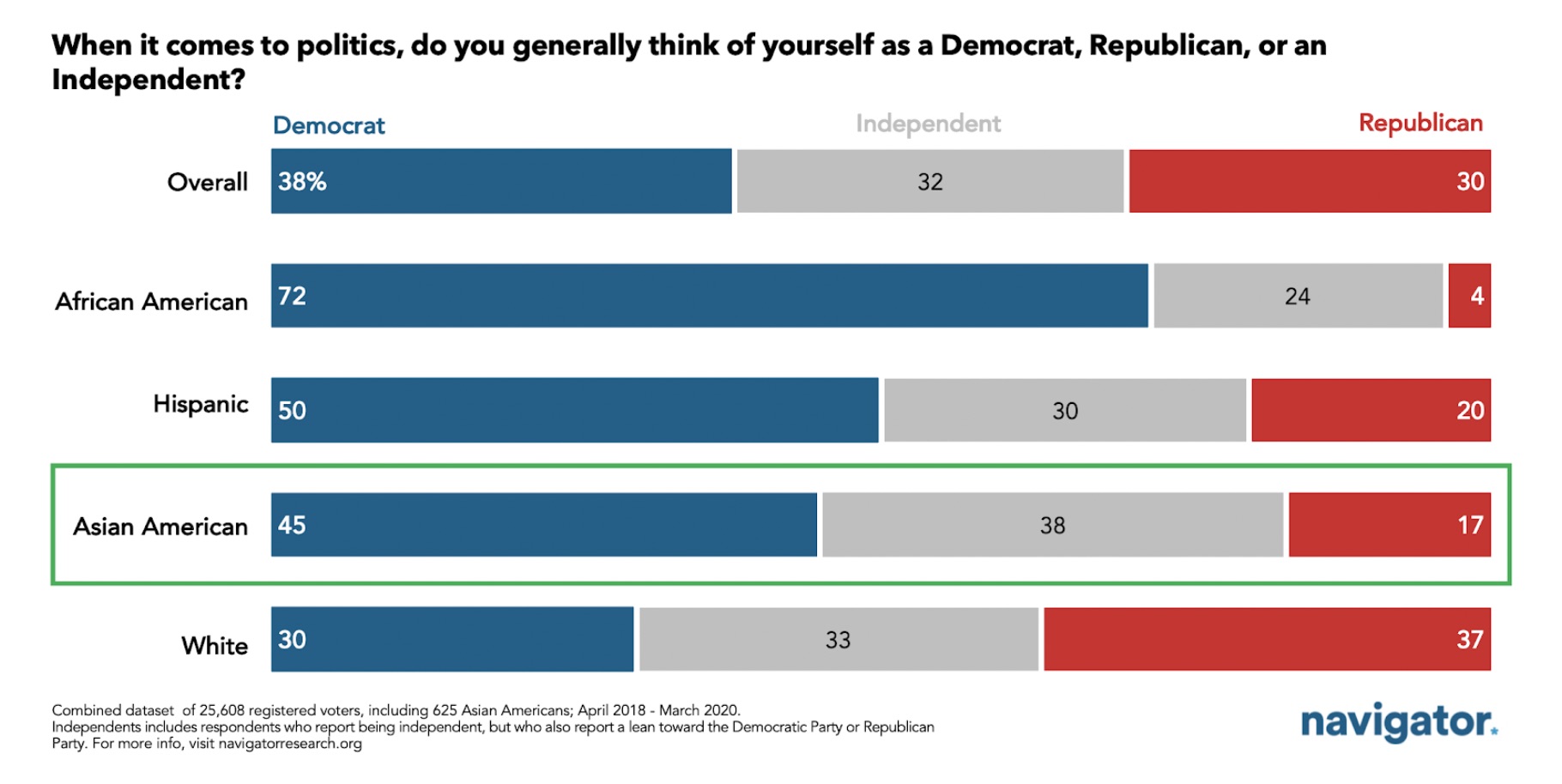
Asian Americans, and particularly women with a college degree, disapprove of Trump over a variety of metrics. On the question of Trump’s job approval, 68% of Asian Americans disapprove of Trump and just 28% approve (versus 56% disapprove, 41% approve overall). While there is an intensity gap with strong disapproval (45%) being twice as strong as strong approval (22%), when looking at the country overall, it is four times as strong among Asian Americans (48% strong disapproval compared to 12% strong approval).There are significant differences in how Asian Americans view Trump based on gender and education in particular. Asian American women who have a college degree are the most disapproving segment (77%), followed by women without a college degree (67%), men without a college degree (64%), and men with a college degree (63%).
Despite giving Trump a negative rating overall on job approval, Asian Americans overall tend to rate the president less harshly on the economy, where 33% approve and 62% disapprove of his economic performance. A majority disapprove of Trump on the economy, but in terms of generational differences, younger Asian Americans (age 18-49) who tend to be more educated and female are likely to disapprove of Trump on the economy more strongly than those over the age of 50 (66% and 54%, respectively).
In line with their disapproval of Trump, Asian Americans trend liberal on their views of political organizations. For example, a majority of Asian Americans are favorable toward the Democratic Party (47% overall, 57% Asian American), while less than a third are favorable toward the Republican Party (40% overall, 27% Asian American) and an even fewer (39% overall, 14% Asian American) are favorable toward the National Rifle Association (NRA).
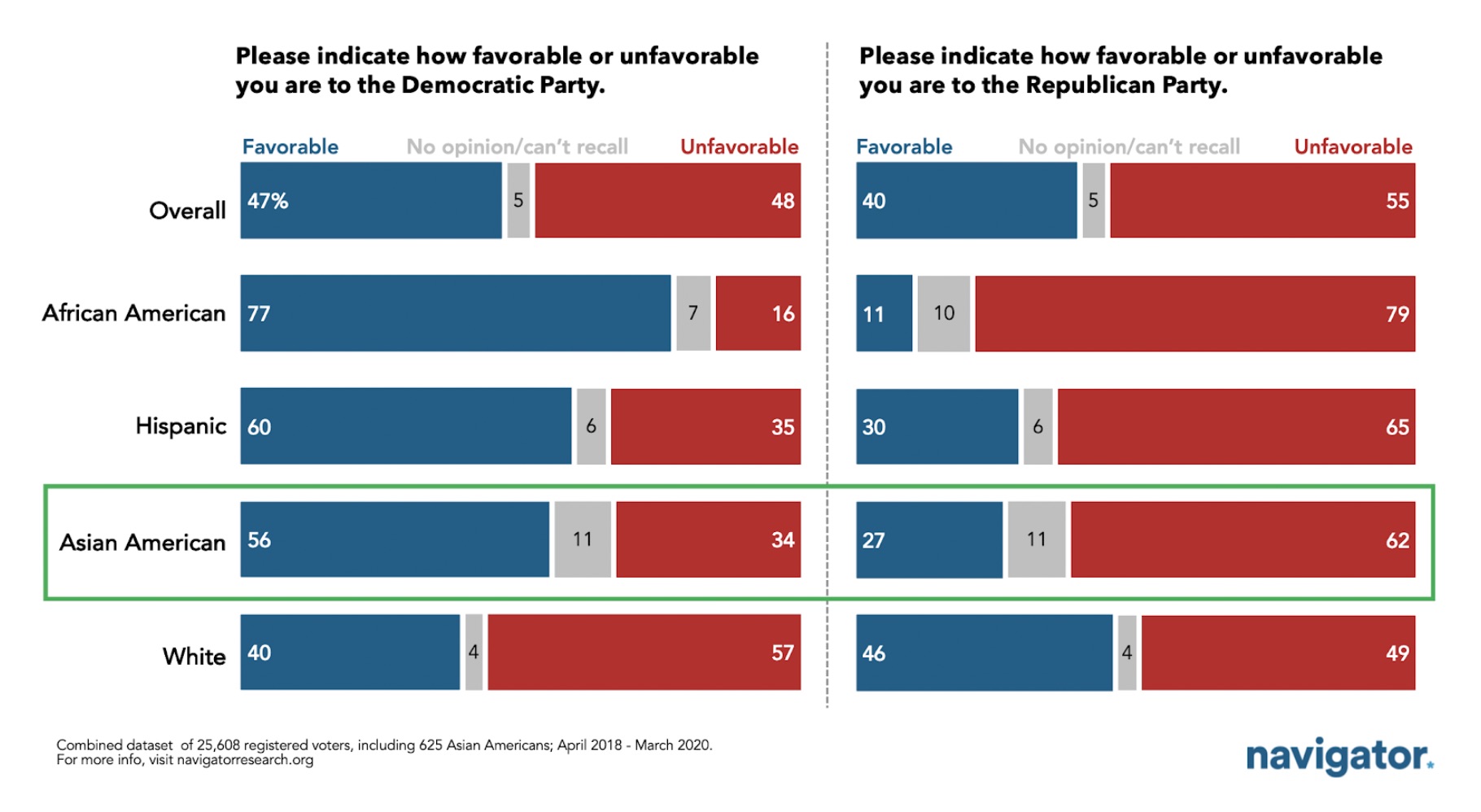
When it comes to political issues, a majority of Asian Americans trend liberal on the economy: in a forced choice, 60% agree with “those who say we need to ensure the economy works for everyone, because right now it’s just wealthy people at the top getting richer, while people who work for a living are falling further behind,” while just 40% say that right now the economy is working just fine.
Public opinion in a crisis: financial concerns rise during the pandemic and Asian Americans agree that the government needs to do more to improve the economy.
Asian Americans continue to disapprove of Trump on the economy, as heightened financial anxiety drives a desire for greater federal action. Over the course of 8 weeks of tracking on the impact of coronavirus, Asian Americans approval of Trump’s job performance has remained relatively stable with 29% approve, 68% disapprove during the pandemic (versus 28% approve, 68% disapprove pre-coronavirus). When rating the president on the economy, Trump’s approval has improved (37% approve, 57% disapprove) relative to his pre-coronavirus ratings (33% and 62%, respectively). Despite this slight bump in Trump’s approval on the economy, a majority continue to disapprove of his economic performance reflecting widespread financial anxieties brought out by the pandemic.
These heightened pocketbook concerns are especially evident in recent dismal ratings of the U.S. economy. Just 14% of Asian Americans rate the current economy as excellent or good while 84% rate it as not so good or poor; this marks a huge shift from pre-coronavirus ratings of the economy, when a majority rated it positively (53% and 42%, respectively). Going further, a majority (58%) say they feel uneasy about their personal finances over the next few months while 39% report feeling confident. A third of Asian Americans expect the direction of the economy to be worse a year from now (34% vs 23% overall), over half expect it to be better (53% vs 64% overall), and 85% say that the economy is already in a recession or headed toward one). With these more pessimistic views of the economy, a higher than average percentage of Asian Americans also say that the federal government needs to do more to improve the economy (59% vs 52% overall).
Asian Americans are especially anxious when it comes to the health impacts of coronavirus and report some of the highest levels of social distancing.
In agreement with Navigator’s previous findings, almost all Asian Americans describe the coronavirus pandemic as a major crisis/problem (99%). However, when it comes to the impact of coronavirus, Asian American respondents tend to report slightly more affected than the population at large. This includes:
- 29% know someone who has been infected (versus 25% of overall);
- 19% personally report having lost their job (versus 14% overall);
- 59% know someone who has lost their job (versus 55% overall);
70% know someone who has had hours cut (versus 66% overall); - 38% have personally or have a family member who has been diagnosed with coronavirus or lost a job (versus 36% overall);
- 56% reported putting off major purchases (versus 48% overall); and,
- 18% applied for unemployment insurance or nutritional assistance (versus 15% overall).
When talking about the health and financial impacts of the pandemic, Asian Americans report higher levels of anxiety than the average American on a variety of concerns. Three quarters of Asian Americans are more worried about their and their family’s health and wellbeing than their personal financial situation. Their top worries during the coronavirus outbreak include:
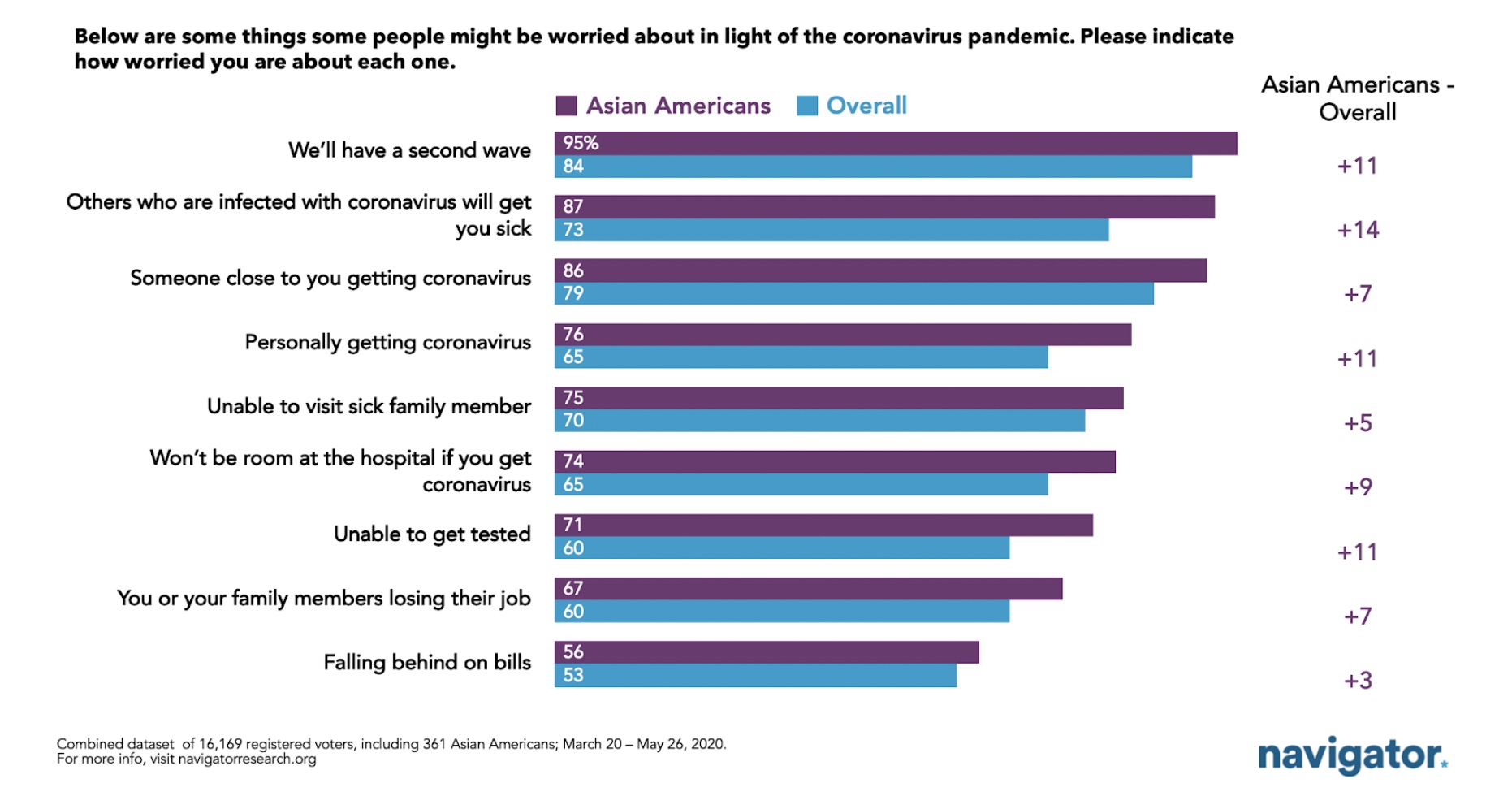
Asian Americans are among the strongest supporters of social distancing measures: 93% think social distancing measures are right or should be more aggressive, with the group split more or less evenly between saying we need more aggressive measures (50%) and saying that we are currently doing the right thing on social distancing (43%). In line with these numbers, Asian Americans are overwhelmingly concerned that social distancing will end too soon (67%) than go on too long (24%) and there is strong opposition to reopening the country too soon (71% Asian American, 62% overall).
While the broader public has changed its behaviors in response to the pandemic, Asian Americans report some of the highest levels of social distancing. Almost a third of Asian Americans report living in states that have been heavily impacted by the pandemic (31% reside in the top ten most infected states, 25% overall). Consequently, 1 in 4 report wearing a mask always or most of the time (24% Asian American, 18% overall) and close to 9 in 10 say they are spending almost all their time at home (89%), avoiding public events and gatherings (88%), and avoiding going out to bars and restaurants (88%). The largest differences in social distancing compared to the country overall are working from home (45% Asian American, 26% overall) and avoiding in-person interactions with friends and family (75% Asian American, 67% overall), which may also reflect the particularly white collar (56%) and suburban (57%) makeup of the Asian American community.
2 in 3 Asian Americans disapprove of Trump’s handling of the pandemic as many receive negative impressions of his response to the crisis.
While President Trump has earned split ratings on approval of his handling of the coronavirus pandemic, Asian Americans are far more disapproving. Across all the interviews conducted in Navigator’s daily tracking to date, a majority disapprove of Trump’s handling of the pandemic (46% approve – 51% disapprove), but among Asian Americans, his net disapproval rating is -34 (32% approve – 66% disapprove). Along these lines, they are more likely to have heard mostly negative things about Trump and coronavirus compared to the general population (53% Asian American, 43% overall). Similarly, 59% trust Democrats in Congress to respond to the coronavirus outbreak compared to just 23% who trust Trump to respond (versus 45% Democrats and 42% Trump overall).
Asian Americans are also more likely to say that Trump’s response to coronavirus did not take seriously enough the threat of the pandemic (74%, compared to 61% overall), and just 27% think that Trump’s current response to the pandemic is getting it about right (compared to 40% overall). When characterizing Donald Trump’s response to coronavirus, the traits most associated with the president are “unprepared,” (74%) “self-absorbed,” (74%) and “chaotic” (71%). On the other hand, just 27% say that “compassionate” applies to Trump’s response, while 69% disagree.
When looking at the concerns raised by Trump’s handling of coronavirus, over three-quarters (78%) say that the president’s words and actions that put people’s lives at risk, including pushing policies that would spread the virus further and promoting dangerous medical advice, raise serious concerns (compared to 59% overall). Top concerns for Asian Americans on Trump’s response to the pandemic include:
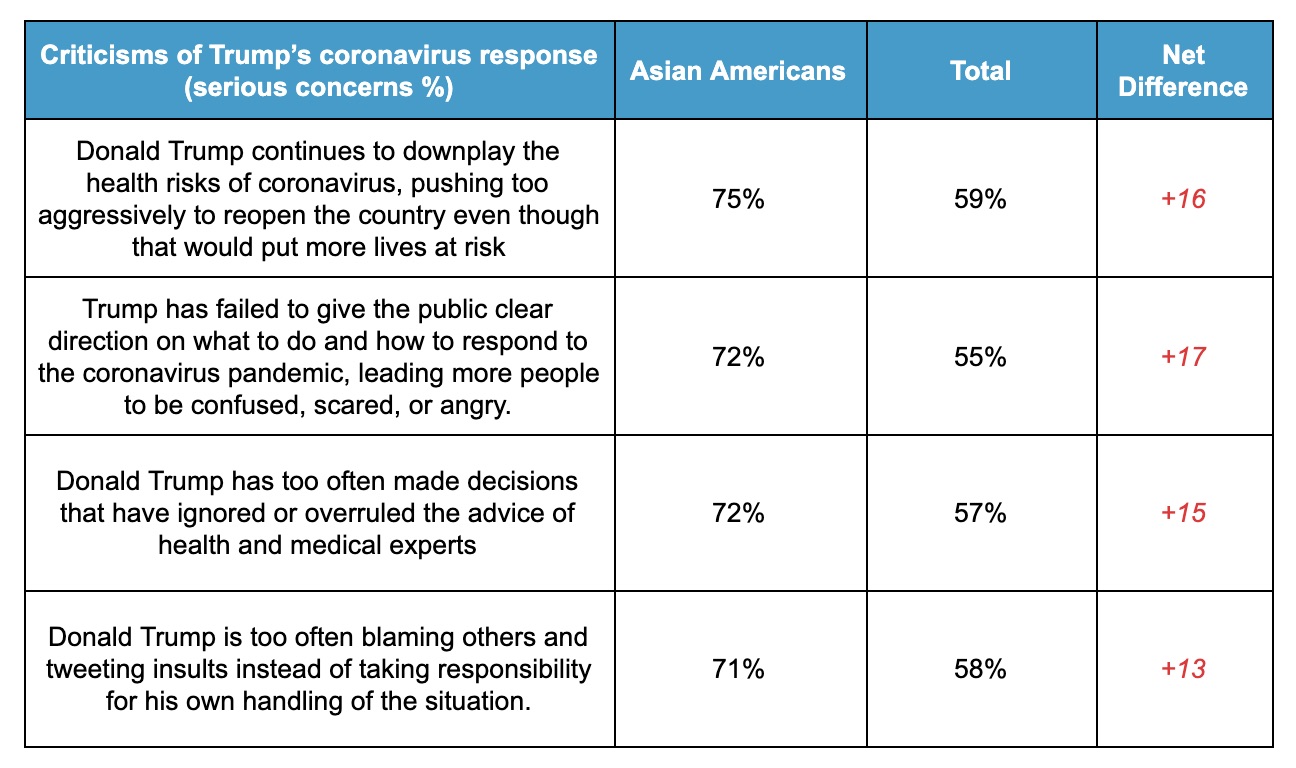
Navigator has previously highlighted the trend that state governors are receiving a higher rating on handling the pandemic than President Trump, and that finding is even more pronounced among Asian Americans. 67% of Americans approve of their governor or mayor compared to Trump’s 46% approval rating, while the difference in rating governors and Trump is wider among Asian Americans: 73% approve of their governor while just 32% approve of Trump’s handling of coronavirus. Moreover, Democratic governors receive even higher marks from Asian Americans (76% approve) on responding to the pandemic. When asked whether more trust is placed in local governments versus Trump and the federal response, state and local government is trusted more by a 49-point margin (68% to 19%), significantly higher than the 24-point margin among the overall public.
Finally, Navigator has tracked how Americans are evaluating who is benefiting most from Trump’s economic response to the pandemic. Among the public overall, 51% say that the wealthy and big corporations have been the biggest winners versus 34% who say middle and working class people, but among Asian Americans, the percentage saying the wealthy and big corporations are the primary beneficiaries rises to 42 points over working people (65% to 23%). Conversely, 64% of Asian Americans say that the Democrats’ economic response to coronavirus favors middle and working class people and just 19% say it favors the wealthy and big corporations.
A Closer Look at Navigator’s Asian American Sample
While Navigator is not a definitive guide to understanding the demographics of Asian Americans, based on our sample of 625 interviews, they tend to be younger, more college educated, suburban, and employed in white collar jobs than the general population. A majority of Asian Americans interviewed (59%) are between the ages of 18-49 and tend to report holding college degrees more often than not (59% college degree, 41% no degree), compared to other racial groups which skew toward no degree (White, no degree: 61%, Black, no degree: 74%, Hispanic, no degree: 66%).
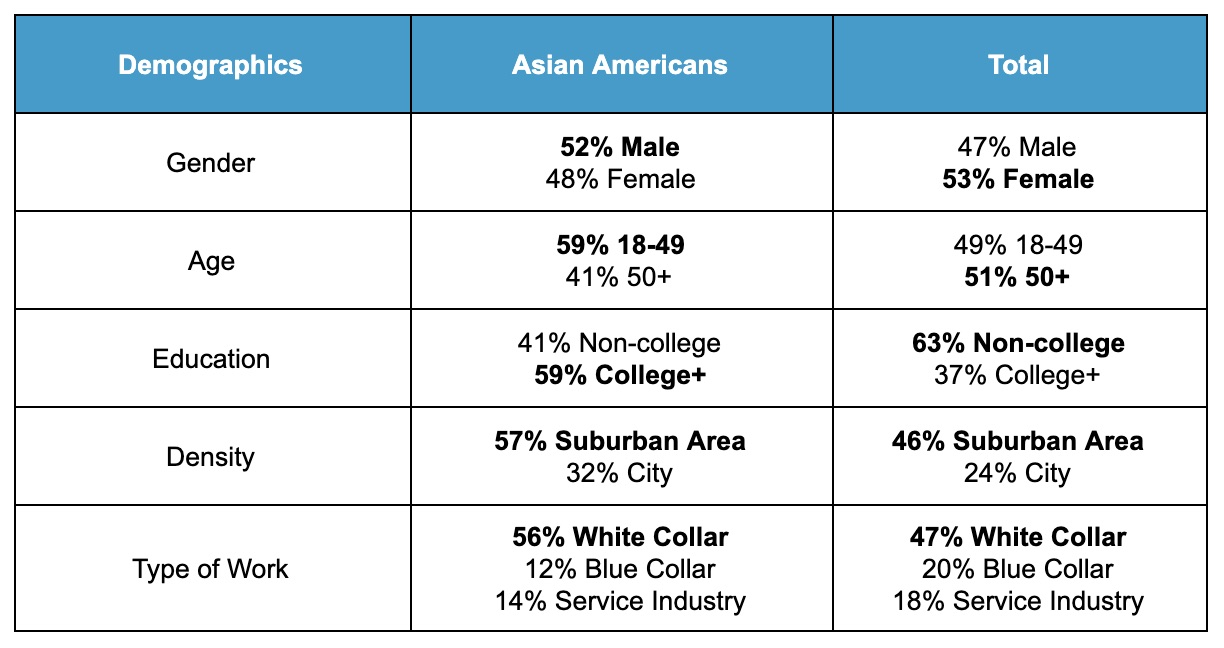
Most Asian Americans interviewed reside in suburban areas (57%) while about a third (32%) reside in cities. Over half characterize their work as “white collar” (56%) compared to just 12% who say “blue collar” and 14% who say “service industry.” Although the group overall is majority male, 52% of those aged 18-49 are female while 57% of those over the age of 50 are male.
